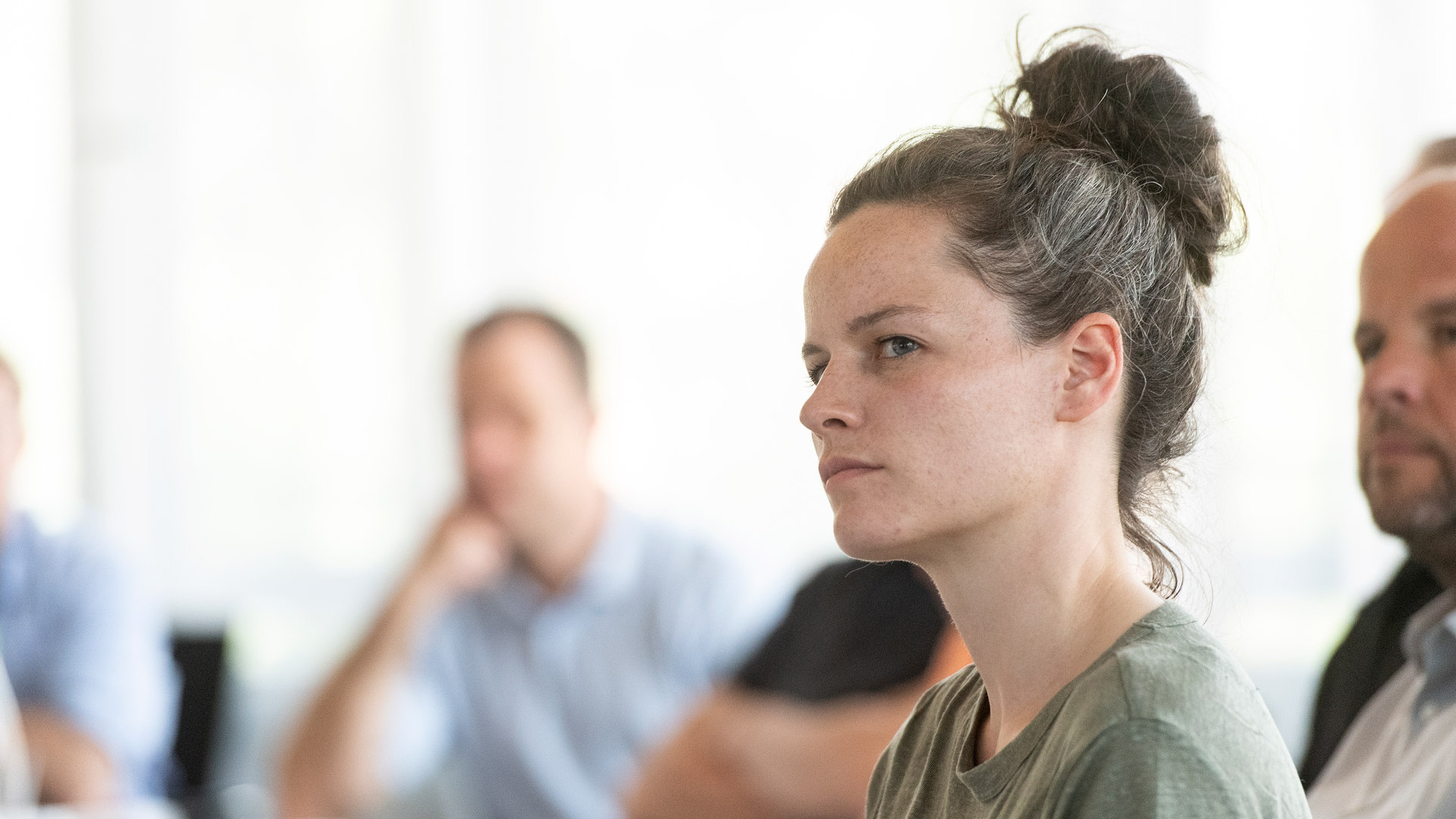The training to become a DGNB Registered Professional is your starting point as a prospective expert in sustainable building. Here you will receive a holistic overview of social, environmental and economic opportunities for action in order to be able to realise sustainability in the construction and real estate sector - from an urban planning perspective to the individual building.
The training will be held in German.
Learning objectives and skills taught
- You will gain confirmed basic knowledge on the topic of sustainability in building and on the DGNB System and proof of a recognised degree.
- You lay the foundation for a career in the field of DGNB Certification as a DGNB Consultant or DGNB Auditor.
- Students and young professionals position themselves early on as future DGNB Certification experts in the growth market of sustainable construction.
The degree DGNB Registered Professional is particularly suitable for students and young professionals who would like to get started with an initial qualification in the field of sustainable building while still studying or choosing a career. The training to become a DGNB Registered Professional is the first step towards further training to become a DGNB Consultant.

Key facts at a glance
- Compact course*: Basics of Sustainable Building
Option 1 – Online (live)
Duration: 2 digital seminar days (6 hrs. each plus breaks)
Option 2 – On-demand (online learning platform)
Duration: One-month access to course content
- Exam to become a DGNB Registered Professional
Duration: 60 min. on one examination day
Note on the examination
The online examination for qualification as a DGNB Registered Professional will take place approximately one to two weeks after your participation in the Basics of Sustainable Building training. We use multiple choice questions to test the contents of the compact course. To pass the exam, you must achieve at least 70 percent. If you do not achieve this on your first attempt, you have a second attempt free of charge.
*Participation in the Basics of Sustainable Building training is not compulsory for you to be able to take the DGNB Registered Professional exam. Based on your previous knowledge, you decide for yourself whether to attend the compact course. However, we recommend attending the course for optimal preparation for the exam. Please ask us for an overview of the topics relevant to the exam for a better assessment.
Sustainable building as a subject of study
More than 100 universities cooperate with the DGNB Academy. Students whose university is a DGNB partner university have the opportunity to learn the Basics of Sustainable Building during their studies. Afterwards, the title DGNB Registered Professional can be obtained directly through an examination at the DGNB Academy.
In the compact course Basics of Sustainable Building, you will learn what sustainability means and which important sustainability goals are defined at the political level. You will learn about the ecological footprint of the construction industry and its impact on socio-cultural issues such as health, comfort and social mix. As 'sustainable' also means planning for the long term and the whole life cycle, aspects such as reusability and recyclability also play a role.
We will show you the fields of action and concrete measures you can take to put sustainability into practice on an environmental, economic and socio-cultural level, and compare different options. We will also introduce you to the basic structure and objectives of Life Cycle Assessment (LCA), Life Cycle Costing (LCC) and the DGNB System.
Topic 1: Sustainability and environmental protection in planning and building
The construction industry has a significant impact on the pressing environmental crises of our time. We need to rethink entrenched patterns to mitigate climate change, biodiversity loss and resource depletion, and adapt our built environment to changing conditions.
- Current (environmental) crises and the impact of the construction industry
- Definitions of sustainability, sustainability models and policy objectives
- Conservation of resources
- Environmental protection and climate change adaptation
Topic 2: Holistic planning and building
- Holistic planning and building
- Integral Planning
- Design and social aspects
- Health and user satisfaction
Topic 3: Life cycle-oriented planning
Life cycle-oriented planning and building helps to promote sustainability in a holistic way. The impact of design measures over the life cycle can be made visible and comparable through different accounting methods.
- Pollutants and risk substances in the life cycle of buildings
- Long-term adaptability and usability
- Introduction to life cycle assessment (LCA)
- Introduction to life cycle costing (LCC)
- Insight into the DGNB Certification System
- Certificate of attendance for the compact course you attended
After passing the exam:
- Acquisition of the recognised DGNB Registered Professional degree
- DGNB Registered Professional certificate in digital form
- DGNB Registered Professional logo incl. DGNB style guide to communicate your qualification (e.g. for your e-mail signature, website or communication materials)
- One year trial membership in the DGNB association - free of charge and self-terminating (exclusively for students of a DGNB partner university)
| DGNB member/member of a cooperating training institution* | DGNB non-member | Student** | |
|---|---|---|---|
| Compact course: Basics of Sustainable Building | €450 | €590 | €330 |
| DGNB Registered Professional exam | €290 | €340 | €110 |
| Total | €740 | €930 | €440 |
All fees are subject to statutory VAT.
The reduced fees apply according to the DGNB fee schedule for all ordinary members and group members of the DGNB and their employees.
*When booking, please enclose valid evidence of membership of a cooperating training institution.
**When booking, please enclose a valid certificate of enrolment.
Groups (10 participants or more)
For group bookings of 10 people or more, please contact us by writing to ausbildung@dgnb.de.
Dates and registration

Become a DGNB Registered Professional
Please note: as training is held in German, please switch to German language settings to make a booking.
Frequently asked questions about the DGNB Registered Professional
Usually, the training to become a DGNB Registered Professional takes two to three weeks. If you decide to participate in the online live format, the course and subsequent exam will take a maximum of 3 days to complete. If you choose the on-demand learning format via the DGNB learning platform, you will have access to the course content for one month and can determine your own learning pace. In both cases, you should allow an additional 10 to 20 hours to prepare for the exam.
After failing the DGNB Registered Professional exam for the first time, you will receive a second attempt free of charge. A third attempt is possible. For this, we charge 50 percent of the exam costs.
If you do not pass at the latest on the third attempt, you have the option of taking an oral exam as a last resort. This will only take place on request and in person at the DGNB office. We charge the full exam fee for this.
As a student at a DGNB partner university, you have the opportunity to take the compact course Basics of Sustainable Building free of charge at your university. You will also receive reduced conditions if you take the exam to become a DGNB Registered Professional via the DGNB Academy (110 € instead of 340 € plus VAT). Students from DGNB partner universities who have successfully completed the DGNB Registered Professional exam also benefit from a free one-year trial membership at DGNB e.V., which is self-terminating at the end of the period.
The degree of DGNB Registered Professional is not a prerequisite for admission to the DGNB Consultant course. If you have not taken the exam to become a DGNB Registered Professional, the content taught in the compact course Basics of Sustainable Building will also be required in the exam to become a DGNB Consultant.
The offer to visit the Basics of Sustainable Building course is open to all interested persons. Dates and registration can be found here.
